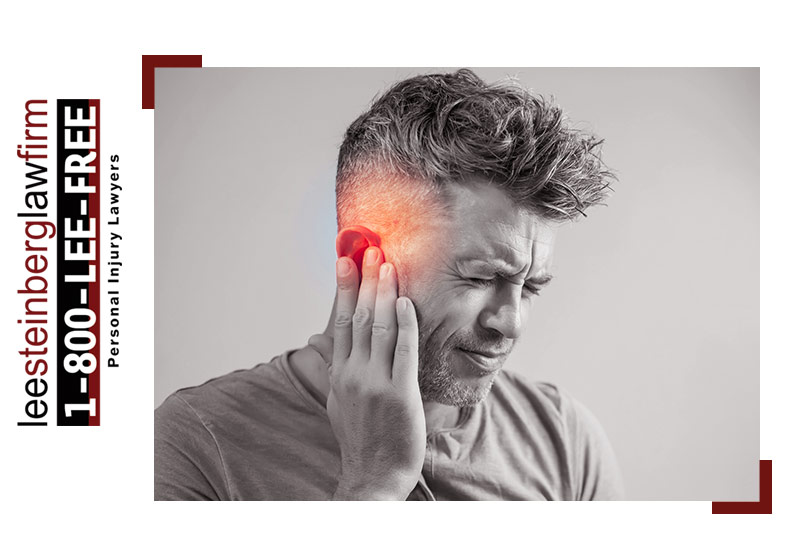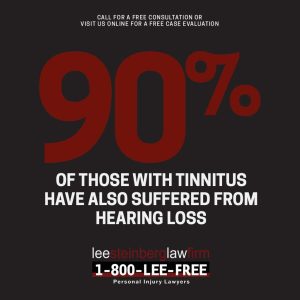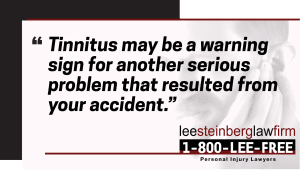
Car accidents in Detroit can cause drivers and passengers to suffer from any number of injuries, and one resulting condition that many people struggle with is ringing in their ears.
If you’ve noticed your ears ringing after a collision, you need to seek medical attention immediately, as it may indicate a serious or even life-threatening injury. These injuries often require expensive medical bills, and you shouldn’t be forced to pay out of pocket if another driver was at fault for your accident. Fortunately, you can file a claim with the at-fault driver’s insurance company or pursue a lawsuit if necessary.
Here at Lee Steinberg Law Firm, our Detroit car accident lawyers know that recovering fair compensation after a collision can be incredibly challenging, especially if you’re struggling with injuries. Our car accident lawyers are here for you if you need assistance with your case.
Regardless of whether you require legal assistance, we’re here to teach you everything you need to know about the ringing in your ears after a vehicular collision.
Why Are My Ears Ringing After a Car Accident?

If you notice a ringing in your ears after an accident, you’ve developed tinnitus. Tinnitus is a medical condition that causes a ringing, buzzing, or another noise in one or both ears without an external source of sound. It is a common condition that affects millions of people worldwide and has many underlying causes, including car accidents.
Tinnitus can be a temporary or chronic condition and can significantly impact a person’s quality of life, especially if it’s a symptom of hearing loss. Tragically, around 90% of those with tinnitus have also suffered from hearing loss, and the condition may also be a warning sign of further hearing degradation.
Why Tinnitus Is Common After Car Accidents
A few reasons why it’s especially common for victims to develop tinnitus after a crash is due to the sudden impact of collisions, airbag deployments, and loud noises. Exposure to loud noises can cause hearing loss and tinnitus, so noisy car accidents may cause victims to suffer from the condition.
Additionally, tinnitus may be a warning sign for another serious problem that resulted from your Detroit car accident, including:

- Traumatic Brain Injury (TBI): Car accidents can cause traumatic brain injuries (TBIs) due to the sudden force and impact of collisions. The most common cause of a TBI is a blow or jolt to the head from hitting a steering wheel, dashboard, or window. Even if your head doesn’t strike an object, the force of the impact can cause your brain to move around inside your skull, leading to a serious injury. Around 53% of those suffering from a TBI also develop tinnitus, so if you notice a ringing in your ears, make sure to seek medical attention.
- Whiplash: Whiplash occurs when your head is suddenly jerked forward and then back, causing the neck to move in a rapid motion. This sudden movement can cause damage to the soft tissues in your neck, including muscles, ligaments, and tendons. These injuries are incredibly common in vehicular collisions and can damage your brain’s auditory pathways, causing tinnitus.
- Ear Rupture: Although your vehicle’s airbags play a vital role in protecting you in a crash, they can also damage your hearing. Upon collision, your airbags inflate instantly due to nitrogen gas, and the sudden inflation creates a roaring pressure wave. Unfortunately, this sudden pressure wave can cause hearing loss and tinnitus.
Tinnitus Symptoms
Tinnitus can manifest in many different ways, and symptoms vary from person to person. Some people may hear a constant ringing, while others may experience a pulsing, humming, roaring, hissing, or clicking sound.
In addition to hearing noises that have no external source, you may suffer from other tinnitus symptoms, including:
- Ear pain: Tinnitus can sometimes cause sharp or dull ear pain or discomfort.
- Sensitivity to sound: Tinnitus can also cause increased auditory sensitivity, making it difficult to tolerate loud noises or even normal conversation.
- Difficulty sleeping: Some people with tinnitus may struggle to fall asleep. In fact, a study published in the National Library of Medicine found that around 76% of the study’s tinnitus patients struggled with insomnia.
- Trouble with concentration: Around 41% of those with tinnitus have difficulty concentrating.
If you suffer from any of these conditions after an accident, you should seek medical attention as soon as possible.
How Long Does Ringing in Your Ears Last After a Car Accident in Detroit?
The amount of time you can expect to suffer from tinnitus will depend on the severity of your condition and various factors. In some cases, tinnitus may be temporary and last only a few minutes or hours. However, in other cases, tinnitus may be chronic and last for months or even years, and those suffering from the affliction may develop it gradually over time.
If you’ve recently been involved in a collision, you may be struggling with acute tinnitus caused by noise exposure. Acute tinnitus typically lasts between three and six months.
Sadly, many who develop tinnitus struggle with the condition for extended periods, and those suffering from chronic tinnitus will likely benefit from medical intervention. While there is no cure for tinnitus, there are treatments available to help manage symptoms and improve your quality of life.
Contact a Detroit Car Accident Personal Injury Attorney
If you’re suffering from tinnitus and other conditions after a car accident, you need to seek compensation from the at-fault driver to pay for your medical bills and other losses.
Depending on the severity of your injuries and the circumstances of your crash, you may be able to recover compensation for past and future medical bills, lost wages, loss of future wages, pain and suffering, and more.
Although car accident victims aren’t required to obtain legal representation to file a claim or lawsuit, you can greatly increase your likelihood of recovering the full compensation you deserve by hiring a personal injury attorney. For expert legal support after a car accident in Michigan, contact the Lee Steinberg Law Firm.
You can schedule a free case evaluation today by calling 1-800-533-3733, or you can schedule your consultation online here.
